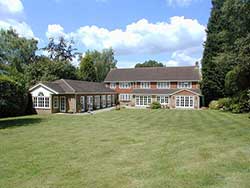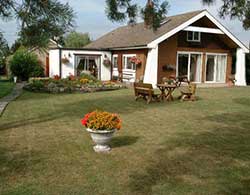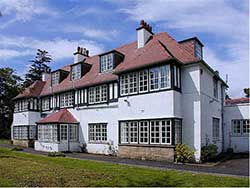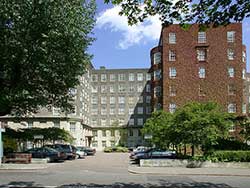|
An Englishman's Home

Mr. David Wright
It is often said that an Englishman’s home is his castle, but (sadly) this is no longer the case, even if it ever once was. Today, numerous petty officials1 have the legal right to enter one’s home. Nevertheless, the home occupies a singular place in the heart and mind of most Englishmen. Many arguments have broken out between otherwise peaceful neighbours over territorial disputes relating to such matters as boundaries, noise, views, overhanging branches2 or underground roots, privacy, etc. Sometimes, these rows have escalated into physical violence, even murder, and/or the spending of many thousands of pounds in lawyers’ fees. These are, of course, extreme cases, but they are surprisingly common.
Most people live in houses: either the traditional, two-storey, brick-built terraced house, ‘semi’3 or superior detached house. Older people whose children have left home or those living alone may prefer a single-storey bungalow, although they may often refer to their dwelling4 as a ‘house’. In some towns, older premises5 may have three or more stories and still be known as ‘houses’.
 In many large towns and cities, where property is expensive, people may live in flats or apartments, either purpose-built6 or converted from some previous structure such as a factory, mill, warehouse or barn. These typically have one or two bedrooms and are occupied by single people or couples without children, but whether they admit it or not, many of them secretly aspire to living in a ‘proper’ house, either when they can afford to or when their working circumstances permit. More affluent7 ‘workers’, such as Members of Parliament, may have a flat in London, which is convenient for their work, and a real house in a rural setting8 for their leisure and relaxation – or even for attending to their constituency9 responsibilities. Other flats are provided by local councils or housing associations for those unable or unwilling to buy or rent their own home.
In many large towns and cities, where property is expensive, people may live in flats or apartments, either purpose-built6 or converted from some previous structure such as a factory, mill, warehouse or barn. These typically have one or two bedrooms and are occupied by single people or couples without children, but whether they admit it or not, many of them secretly aspire to living in a ‘proper’ house, either when they can afford to or when their working circumstances permit. More affluent7 ‘workers’, such as Members of Parliament, may have a flat in London, which is convenient for their work, and a real house in a rural setting8 for their leisure and relaxation – or even for attending to their constituency9 responsibilities. Other flats are provided by local councils or housing associations for those unable or unwilling to buy or rent their own home.
Those fortunate enough to own and live in a house, usually take great pride in its appearance. Some years ago, legislation was introduced which gives certain tenants of rented properties the right to buy them, usually at a preferential10 price. It was then very noticeable which houses in a row of rented dwellings had been bought: suddenly the previously dingy11 appearance was transformed by the addition of brand new doors and windows, woodwork being painted, gardens neat and tidy, etc, when previously such things had been largely neglected. Thus, the natural pride of possession is revealed, but also the inherent snobbishness of the typical English man and woman.

Bungalow
This fierce pride in their homes leads to many houses being given names instead of numbers. This was all very well when people lived in small villages where each person was known to his or her neighbour, but was a nightmare for the poor postman or anyone else looking for an unknown address. The house in which I spent most of my teenage years was called ‘Ryecroft’ and my father took a delight in his address being simply the name of the house followed by that of the village, eg “‘Ryecroft’, Broomfield”. He was quite put out when the Post Office (as it then was) insisted on the houses all being numbered so that our home became “118 Main Road”. To the end, my father persisted in including the house name as well as the obligatory number. To him, and many others the name conveyed12 a personal relationship with his house that was not possible with a mere number.
It is not only the houses themselves, which are the subject of such snobbery, but the addresses also. In the vicinity of my present home, many people prefer to refer to their addresses as being in ‘Cheshire’, which is perceived as an attractive, well-to-do13, rural area, rather than ‘Runcorn’ or ‘Warrington’, which are considered to be working-class, industrial towns. In London, some postcodes are considered to be ‘posher’14 and hence more desirable, than others and may add many thousands of pounds to the price of a house.
 It all becomes even more foolish when it comes down to the streets in which people live. There are many words in English which are used as synonyms for ‘Street’, most of them having particular distinctive meanings in the past, but whose origins are now lost or obscure. It is said that the atlases of London list about 45 different words for ‘Street’ and ‘Square’ in the city. Some of these words have special meanings, for example, a ‘Crescent’ is a curved street, usually beginning and ending in junctions with one other street – making a letter ‘D’ shape; if it continues into a complete ‘O’, it might be called ‘Circle’. ‘Bridge’ and ‘Churchyard’ are self-explanatory and ‘Close’ is a cul-de-sac15. But in many more cases, the original meaning of the word has been lost and only the flavour of its social standing remains. So, the simple word ‘Street’ is seen as demeaning by some, as are ‘Terrace’, denoting a row of conjoined houses in a row, often built by a factory owner for his workers or a council as cheap housing; ‘Buildings’, ‘Alley’, ‘Back’, ‘Passage’ and ‘Yard’ are small, insignificant thoroughfares;16 so these all tend to be frowned17 on as ‘common’ and thus less desirable than some others. If an address contains a word such as ‘Park’ or ‘Gardens’, this suggests a degree of opulence and thus a higher social standing for the occupants. A ‘Road’ is slightly superior to a ‘Street’ as it suggests a destination, rather than just a row of houses. An ‘Avenue’ or ‘Broadway’ implies a certain spaciousness with trees planted on either side, such as could only be found in a more expensive area – ‘Boulevard’ even more so. Similarly, ‘Grove’, ‘Approach’, ‘Common’ and ‘Lane’ indicate a rural setting remote from the actual urban environment. ‘Arcade’ is much better than saying ‘row of shops’! The more modern equivalent might be ‘Centre’. To call a row of houses, ‘Cottages’ conveys the unwelcome similarity of ‘Terrace’, but adds a touch of redeeming18 antiquity so beloved by Englishmen and especially, Englishwomen, whilst ‘Villas’ are even older, conjuring up visions of ancient Rome. ‘Court’ is as insignificant as ‘Alley’ or ‘Yard’, but suggests exclusivity, so is much to be preferred. ‘Drive’ is highly desirable with its implications of the approach to a large country house or a route where only the wealthy drove their carriages. A ‘Walk’ is less exalted19 than a ‘Drive’, but still smack of the leisured classes. The cul-de-sac next to my close is called a drive for no reason other than to add to its appeal to the more snobbish and add to the price of its homes. An ‘Embankment’ runs beside a river, of course; and a ‘Junction’ is just that! ‘Gate’ is interesting in that it may have the simple, modern meaning of an entrance to or exit from a town, but it may be derived from the old Viking (Norse) word for a road (whose root is also preserved in the North British word ‘gang’ = ‘go’). ‘Mansions’ is several social steps above the mundane ‘Buildings’, but not yet attaining to the heights of ‘Palace’. If a ‘Square’ is not just that, at least it should be some sort of quadrilateral20, usually arranged around some vegetation such as a small grassy area or a garden with trees or bushes. Of course, this being England, there are numerous exceptions and contradictions: for example, one of the longest and oldest roads running right from the south-east to the north-west of the country is called ‘Watling Street’! The connotations are often different in other parts of the English-speaking world: no New Yorker would consider ‘Fifth Avenue’ to be a quiet, tree-lined road, nor ‘42nd Street’ to be a poor, mean place.
It all becomes even more foolish when it comes down to the streets in which people live. There are many words in English which are used as synonyms for ‘Street’, most of them having particular distinctive meanings in the past, but whose origins are now lost or obscure. It is said that the atlases of London list about 45 different words for ‘Street’ and ‘Square’ in the city. Some of these words have special meanings, for example, a ‘Crescent’ is a curved street, usually beginning and ending in junctions with one other street – making a letter ‘D’ shape; if it continues into a complete ‘O’, it might be called ‘Circle’. ‘Bridge’ and ‘Churchyard’ are self-explanatory and ‘Close’ is a cul-de-sac15. But in many more cases, the original meaning of the word has been lost and only the flavour of its social standing remains. So, the simple word ‘Street’ is seen as demeaning by some, as are ‘Terrace’, denoting a row of conjoined houses in a row, often built by a factory owner for his workers or a council as cheap housing; ‘Buildings’, ‘Alley’, ‘Back’, ‘Passage’ and ‘Yard’ are small, insignificant thoroughfares;16 so these all tend to be frowned17 on as ‘common’ and thus less desirable than some others. If an address contains a word such as ‘Park’ or ‘Gardens’, this suggests a degree of opulence and thus a higher social standing for the occupants. A ‘Road’ is slightly superior to a ‘Street’ as it suggests a destination, rather than just a row of houses. An ‘Avenue’ or ‘Broadway’ implies a certain spaciousness with trees planted on either side, such as could only be found in a more expensive area – ‘Boulevard’ even more so. Similarly, ‘Grove’, ‘Approach’, ‘Common’ and ‘Lane’ indicate a rural setting remote from the actual urban environment. ‘Arcade’ is much better than saying ‘row of shops’! The more modern equivalent might be ‘Centre’. To call a row of houses, ‘Cottages’ conveys the unwelcome similarity of ‘Terrace’, but adds a touch of redeeming18 antiquity so beloved by Englishmen and especially, Englishwomen, whilst ‘Villas’ are even older, conjuring up visions of ancient Rome. ‘Court’ is as insignificant as ‘Alley’ or ‘Yard’, but suggests exclusivity, so is much to be preferred. ‘Drive’ is highly desirable with its implications of the approach to a large country house or a route where only the wealthy drove their carriages. A ‘Walk’ is less exalted19 than a ‘Drive’, but still smack of the leisured classes. The cul-de-sac next to my close is called a drive for no reason other than to add to its appeal to the more snobbish and add to the price of its homes. An ‘Embankment’ runs beside a river, of course; and a ‘Junction’ is just that! ‘Gate’ is interesting in that it may have the simple, modern meaning of an entrance to or exit from a town, but it may be derived from the old Viking (Norse) word for a road (whose root is also preserved in the North British word ‘gang’ = ‘go’). ‘Mansions’ is several social steps above the mundane ‘Buildings’, but not yet attaining to the heights of ‘Palace’. If a ‘Square’ is not just that, at least it should be some sort of quadrilateral20, usually arranged around some vegetation such as a small grassy area or a garden with trees or bushes. Of course, this being England, there are numerous exceptions and contradictions: for example, one of the longest and oldest roads running right from the south-east to the north-west of the country is called ‘Watling Street’! The connotations are often different in other parts of the English-speaking world: no New Yorker would consider ‘Fifth Avenue’ to be a quiet, tree-lined road, nor ‘42nd Street’ to be a poor, mean place.
 The naming of the streets makes an interesting exercise in itself. In the past, when single streets or blocks of streets were often built by a single speculator21 or council, they would be named according to a certain theme. One can even guess fairly accurately at the age of such places from their names. For example, a block of streets might be named after (or as our American cousins might say, ‘named for’) the Duke of Wellington’s or Admiral Nelson’s victories, the Crimean War or Queen Victoria’s Jubilee. Nowadays, if this pattern is followed at all, it is more likely that the names of local politicians or their wives will be the subjects as we have few national events to celebrate.
The naming of the streets makes an interesting exercise in itself. In the past, when single streets or blocks of streets were often built by a single speculator21 or council, they would be named according to a certain theme. One can even guess fairly accurately at the age of such places from their names. For example, a block of streets might be named after (or as our American cousins might say, ‘named for’) the Duke of Wellington’s or Admiral Nelson’s victories, the Crimean War or Queen Victoria’s Jubilee. Nowadays, if this pattern is followed at all, it is more likely that the names of local politicians or their wives will be the subjects as we have few national events to celebrate.
It is all rather stupid, but ignore it at your peril if you should be buying or selling property in England.
You have been warned!
1 petty officials – мелкие представители власти
2 overhanging branches – свешивающиеся (над чужим участком) ветви (деревьев)
3 ‘semi’ – (разг.) одноквартирный дом, имеющий общую стену с соседним домом
4 dwelling – жилище
5 premises – недвижимость
6 purpose-built – построенный специально
7 affluent – богатый
8 in a rural setting – в сельской местности
9 constituency – избиратели, электорат
10 preferential – льготный
11 dingy – неопрятный
12 convey – передавать
13 well-to-do – зажиточный
14 posh – (разг.) шикарный
15 cul-de-sac – (фр.) тупик
16 thoroughfare – проход
17 frown on – осуждать
18 redeeming – искупляющий
19 exalted – возвышенный
20 quadrilateral – четырехугольник
21 speculator – перекупщик
Читать еще в этой рубрике:
Читать еще в этом номере:
|
|











